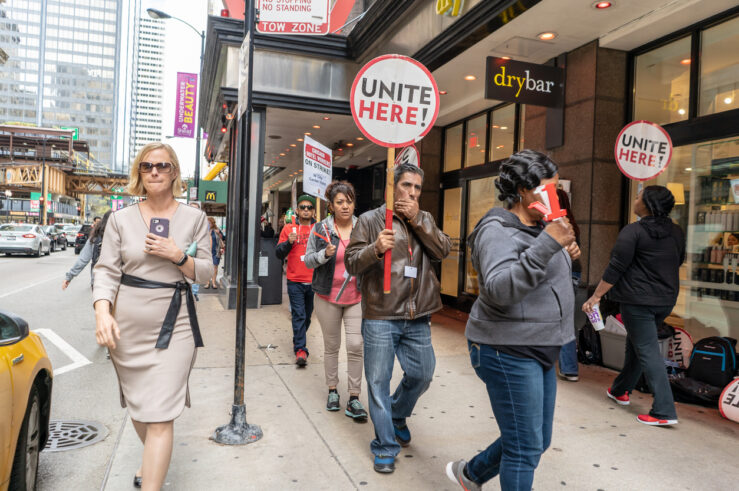Showing archive for: “Labor & Monopsony”
The FTC UMC Roundup–A Weekly Review
Welcome to the FTC UMC Roundup, our new weekly update of news and events relating to antitrust and, more specifically, to the Federal Trade Commission’s (FTC) newfound interest in “revitalizing” the field. Each week we will bring you a brief recap of the week that was and a preview of the week to come. All ... The FTC UMC Roundup–A Weekly Review
Chair Khan’s Latest Flawed Perspective on Mergers Ignores Empirics and Sound Economics
Federal Trade Commission (FTC) Chair Lina Khan missed the mark once again in her May 6 speech on merger policy, delivered at the annual meeting of the International Competition Network (ICN). At a time when the FTC and U.S. Justice Department (DOJ) are presumably evaluating responses to the agencies’ “request for information” on possible merger-guideline ... Chair Khan’s Latest Flawed Perspective on Mergers Ignores Empirics and Sound Economics
Hunting for Labor-Market Monopsonies (and Giffen Goods)
If you wander into an undergraduate economics class on the right day at the right time, you might catch the lecturer talking about Giffen goods: the rare case where demand curves can slope upward. The Irish potato famine is often used as an example. As the story goes, potatoes were a huge part of the ... Hunting for Labor-Market Monopsonies (and Giffen Goods)
Labor Antitrust Analysis Should Focus on Actual Anticompetitive Agreements
Biden administration enforcers at the U.S. Justice Department (DOJ) and the Federal Trade Commission (FTC) have prioritized labor-market monopsony issues for antitrust scrutiny (see, for example, here and here). This heightened interest comes in light of claims that labor markets are highly concentrated and are rife with largely neglected competitive problems that depress workers’ income. ... Labor Antitrust Analysis Should Focus on Actual Anticompetitive Agreements
NEW VOICES: FTC Rulemaking for Noncompetes
On July 9, 2021, President Joe Biden issued an executive order asking the Federal Trade Commission (FTC) to “curtail the unfair use of noncompete clauses and other clauses or agreements that may unfairly limit worker mobility.” This executive order raises two questions. First, does the FTC have the authority to issue such a rule? And ... NEW VOICES: FTC Rulemaking for Noncompetes
Can the FTC Use Rulemaking to Change Antitrust Law?
FTC Rulemaking Power In 2021, President Joe Biden appointed a prolific young scholar, Lina Khan, to chair the Federal Trade Commission (FTC). Khan strongly dislikes almost every element of antitrust law. She has stated her intention to use notice and comment rulemaking to change antitrust law in many ways. She was unable to begin this process ... Can the FTC Use Rulemaking to Change Antitrust Law?
A First Glance at the Biden Executive Order on Competition: The Good and the Bad (Including Much that Looks Ugly)
The Biden Administration’s July 9 Executive Order on Promoting Competition in the American Economy is very much a mixed bag—some positive aspects, but many negative ones. It will have some positive effects on economic welfare, to the extent it succeeds in lifting artificial barriers to competition that harm consumers and workers—such as allowing direct sales ... A First Glance at the Biden Executive Order on Competition: The Good and the Bad (Including Much that Looks Ugly)
The Supreme Court Misses the Big Consumer Welfare Picture in NCAA v. Alston
In its June 21 opinion in NCAA v. Alston, a unanimous U.S. Supreme Court affirmed the 9th U.S. Circuit Court of Appeals and thereby upheld a district court injunction finding unlawful certain National Collegiate Athletic Association (NCAA) rules limiting the education-related benefits schools may make available to student athletes. The decision will come as no ... The Supreme Court Misses the Big Consumer Welfare Picture in NCAA v. Alston
Four Reasons to Reject Neo-Brandeisian Critiques of the Consumer Welfare Approach to Antitrust
In the battle of ideas, it is quite useful to be able to brandish clear and concise debating points in support of a proposition, backed by solid analysis. Toward that end, in a recent primer about antitrust law published by the Mercatus Center, I advance four reasons to reject neo-Brandeisian critiques of the consensus (at ... Four Reasons to Reject Neo-Brandeisian Critiques of the Consumer Welfare Approach to Antitrust
The NCAA: Dr Jekyll or Mr Hyde?
The U.S. Supreme Court will hear a challenge next month to the 9th U.S. Circuit Court of Appeals’ 2020 decision in NCAA v. Alston. Alston affirmed a district court decision that enjoined the National Collegiate Athletic Association (NCAA) from enforcing rules that restrict the education-related benefits its member institutions may offer students who play Football ... The NCAA: Dr Jekyll or Mr Hyde?
The Dangerous Implications of Changing Antitrust Presumptions
One of the key recommendations of the House Judiciary Committee’s antitrust report which seems to have bipartisan support (see Rep. Buck’s report) is shifting evidentiary burdens of proof to defendants with “monopoly power.” These recommended changes are aimed at helping antitrust enforcers and private plaintiffs “win” more. The result may well be more convictions, more ... The Dangerous Implications of Changing Antitrust Presumptions
A Law & Economics Perspective on Ruth Bader Ginsburg
With the passing of Justice Ruth Bader Ginsburg, many have already noted her impact on the law as an advocate for gender equality and women’s rights, her importance as a role model for women, and her civility. Indeed, a key piece of her legacy is that she was a jurist in the classic sense of ... A Law & Economics Perspective on Ruth Bader Ginsburg











